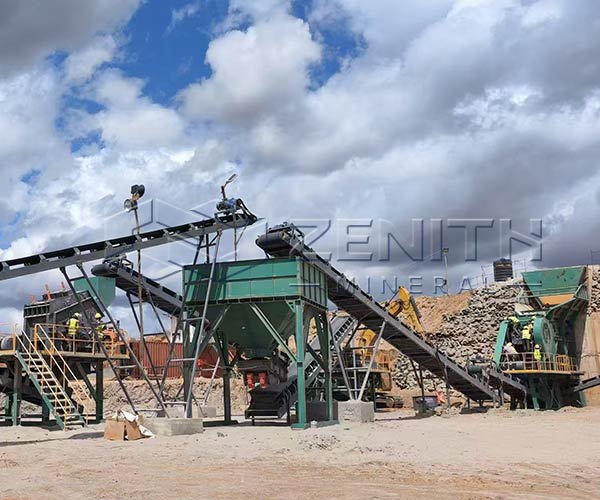
Impact, jaw, and cone crushers each offer unique advantages for stone crushing, catering to different stages and material types in the production process. By understanding their functionality, comparing their features, and evaluating cost factors, buyers can make informed decisions when purchasing these machines.
24 Online Service
Stone crusher machines are essential equipment in mining, construction, road building, and recycling industries, transforming large rocks into smaller, usable aggregates.
These machines are critical for producing materials used in concrete, asphalt, road base, and other construction applications.
The most common types of stone crushers for sale include jaw crushers, impact crushers, and cone crushers, each designed for specific crushing tasks and material types.
Selecting the right crusher depends on material hardness, required output size, production capacity, and application field.
Jaw crushers are primarily used for the first stage of crushing, handling large rocks and hard, abrasive materials such as granite, basalt, and quartz.
The machine operates by compressing material between a stationary fixed jaw and a moving swing jaw, breaking it down through mechanical pressure.
Typical jaw crusher models, such as the PE series, offer a range of feed openings and capacities, from 50–120 tons per hour up to 500–1100 tons per hour, making them adaptable to both small and large-scale operations.
Impact crushers use high-speed impact forces rather than pressure to break down materials, making them ideal for softer, less abrasive rocks like limestone, concrete, and construction waste.
These machines are commonly used for secondary or tertiary crushing, producing uniform, cubical-shaped aggregates preferred for concrete and asphalt recycling.
Impact crushers are available in horizontal shaft (HSI) and vertical shaft (VSI) configurations, each optimized for specific applications and output requirements.
Compared to jaw crushers, impact crushers are better suited for materials that are not very abrasive and are typically used after primary crushing.
Cone crushers are designed for secondary and tertiary crushing of mid-hard and above mid-hard rocks and ores, such as granite, basalt, iron ore, and gold ore.
The machine works by squeezing material between a gyrating spindle (covered by a mantle) and a concave bowl liner, breaking it down through compressive force.
Cone crushers are often favored for their ability to handle harder materials and deliver a finer, more uniform product compared to jaw or impact crushers.
Initial investment costs for cone crushers are higher, but they offer better long-term cost-effectiveness, especially when processing hard rock.
| Feature | Jaw Crusher | Impact Crusher | Cone Crusher |
|---|---|---|---|
| Crushing Mechanism | Compression | High-speed impact | Compression (between mantle & bowl) |
| Best for | Hard, abrasive materials | Softer, less abrasive materials | Hard, mid-hard rocks and ores |
| Typical Use | Primary crushing | Secondary/tertiary crushing | Secondary/tertiary crushing |
| Output Shape | Variable, less cubical | Consistent, cubical | Finer, uniform, excellent shape |
| Maintenance | Moderate | Higher (wear parts) | Lower (with proper use) |
| Investment Cost | Moderate | Lower initial, higher upkeep | Higher initial, lower long-term |
| Capacity | Wide range | Moderate to high | High (large-scale operations) |
Jaw crushers are the go-to choice for the initial reduction of large, hard rocks in mining and quarrying.
Impact crushers excel in producing high-quality, cubical aggregates from softer materials and are widely used in recycling and road construction.
Cone crushers deliver superior performance in hard rock applications and are ideal for producing fine, uniform aggregates for concrete and asphalt.
Assess the material type, hardness, and abrasiveness to determine the most suitable crusher.
Consider the required output size and production capacity for your specific application.
Evaluate the total cost of ownership, including initial investment, maintenance, and operational costs.
For projects involving gold mining or basalt crushing for road construction, jaw and cone crushers are often preferred due to their ability to handle hard, abrasive materials.
For construction waste recycling or aggregate production from softer stones, impact crushers provide efficient and cost-effective solutions.
Stone crusher machines—jaw, impact, and cone—are indispensable for modern construction, mining, and recycling industries, each offering unique advantages for different materials and project requirements.
Understanding the strengths and applications of each crusher type ensures optimal performance, cost efficiency, and high-quality end products.
Whether you are crushing hard granite for mining, recycling concrete for road construction, or producing aggregates for infrastructure, selecting the right stone crusher machine is crucial for success in today’s demanding industrial landscape.
Our Projects
Copyright © ZENITH, All Right Reserved.
